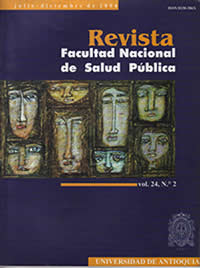El neoliberalismo como amenaza para el acceso a la salud de los colombianos
DOI:
https://doi.org/10.17533/udea.rfnsp.253Abstract
Retomaré apartes del artículo escrito por las profeso-ras Graciela Zaldúa, María Teresa Lodieu, Ana Tisera y Paula Gaillard, de la Facultad de Psicología de la Uni-versidad de Buenos Aires, para expresar mis opiniones con respecto a este tema, ya que sus planteamientos en-cajan perfectamente en nuestra realidad colombiana.
Downloads
References
. Loureiro S. Crisis, medidas de ajuste y su impac-to en la salud. Revista Salud, Problema y Debate 1991;3(6).
Laurell AC. La política social en el proyecto neoli-beral. Necesidades económicas y realidades socio-políticas. Rosario: Centro de Estudios Médicos y Sociales; 1992. Cuadernos Médico Sociales: 60.
Laurell AC. Coordinadora Universidad Autónoma Mexicana. Nuevas Tendencias y Alternativas en el Sector Salud. Universidad Autónoma Metropolita-na. México: Universidad Autónoma Metropolitana; 1994.
Arce H. Tendencias, escenarios y fenómenos emer-gentes en la configuración del sector salud en la Ar-gentina. Santiago de Chile: CEPAL, Naciones Uni-das; 1997. Serie Financiamiento del Desarrollo: 59.
Petras, James. Globalización e imperialismo En: Globaloney. El lenguaje imperial, los intelectuales y la izquierda. Capital Federal Argentina: Editorial Antídoto; 2000
Otras referencias•
Anderson P. Las antinomias de Antonio Gramsci. Barcelona: Fontamara; 1981.
• Anderson P. Las lecciones del neoliberalismo. Re-vista El Rodaballo 1995-1996;2 (3) .
• Arrigí G. El largo siglo XX. España: Akal; 2000.
• Dejours C. Trastornos mentales relacionados con el trabajo. En: Kalimo R. El-6. Batawi M, Cooper CL. Los factores psicosociales en el trabajo y su relación con la salud. Ginebra:OMS; 2005.
• Dejours C. Asociación Trabajo y Sociedad CONI-CET. PIETTE. El Factor Humano. Buenos Aires: Lumen Humanitas; 1998
• Dessors D, Guiho M. Asociación Trabajo y Socie-dad. PIETTE. CONICET. Organización del trabajo y salud. De la psicopatología a la dinámica del tra-bajo
• Ferrer A. Atrapados en la globalización. Argentina: Clarín; 2001.
• Gramcsi A. Los intelectuales y la organización de la cultura. México: Editorial Juan Pablos; 1975.
• Iriart C. La reforma del sector salud en la Argentina. En: Centro de Estudios y Asesoría en Salud. Refor-ma en Salud. Lo privado a lo solidario. Ecuador: Centro de Estudios y Asesoría en Salud; 1997.
• McDougall J. Teatros del cuerpo. Francia: (s.l.); 1991.
• Minujin A. Transformaciones en la estructura social argentina. Cuesta Abajo. Los nuevos pobres: efectos de la crisis en la sociedad argentina.Buenos Aires: Unicef/Losada ;1992.
• Muro M. Los sistemas de atención médica de emer-gencia en la república Argentina En:Secretaría de Salud del Gobierno de la Ciudad de Buenos Aires SAME. 2001; 9 (1) CAICYT/CONICET.200120.
• Rivera, A. Presencia del síndrome de Burnout en médicos del Hospital Clínico Quirúrgico Hermanos Ameijeiras. (Tesisde maestría) México: Universi-dad Nacional Autónoma de México, Facultad de Psicología; 1997.
• Souza GW. Subjetividad y administración de per-sonal: consideraciones sobre modos de gerenciar el trabajo en equipos de salud. En: Testa M et al. Praxis en Salud. Buenos Aires: Lugar Editorial; 1997.
• Souza MC. Etapa de trabajo de campo. En: El de-safío del conocimiento. Investigación cualitativa en salud. Buenos Aires. Lugar Editorial; 1995.
Downloads
Published
How to Cite
Issue
Section
License
Copyright (c) 2023 David E. Guerra

This work is licensed under a Creative Commons Attribution-NonCommercial-ShareAlike 4.0 International License.
The contents of the articles are the responsibility of the authors
The editorial committee has editorial independence from the National School of Public Health "Héctor Abad Gómez" of the University of Antioquia.
The editorial committee is not responsible for aspects related to copying, plagiarism or fraud that may appear in the articles published in it.
When you are going to reproduce and disclose photographs or personal data in printed or digital format, informed consent is required. Therefore, this requirement is required of the author at the time of receipt of the manuscript.
Authors are responsible for obtaining the necessary permissions to reproduce any material protected by reproduction rights.
The authors preserve the moral rights and assign the economic rights that will correspond to the University of Antioquia, to publish it, distribute electronic copies, include them in indexing services, directories or national and international databases in Open Access, under the Creative Commons Attribution license -Not Commercial-Share Equal 4.0 International Commercial (CC BY-NC-SA) which allows others to distribute, remix, retouch, and create from the work in a non-commercial way, as long as the respective credit and license are granted. new creations under the same conditions.
The authors will sign the declaration of transfer of economic rights to the University of Antioquia, after the acceptance of the manuscript.
The editorial committee reserves the right to reject the articles whose authors do not offer satisfactory explanations about the contribution of each author, to meet the criteria of authorship in the submission letter. All authors must meet the four criteria of authorship according to ICMJE: "a) .- That there is a substantial contribution to the conception or design of the article or to the acquisition, analysis or interpretation of the data. b) That they have participated in the design of the research work or in the critical review of its intellectual content. c) .- That has been intervened in the approval of the final version that will be published.d). That they have the capacity to respond to all aspects of the article in order to ensure that issues related to the accuracy or integrity of any part of the work are adequately investigated and resolved. "












 --
--  --
--
